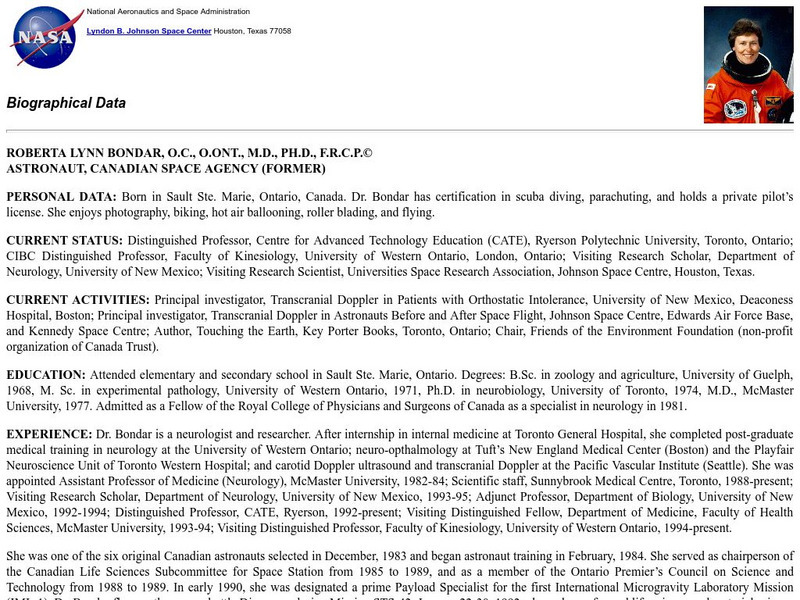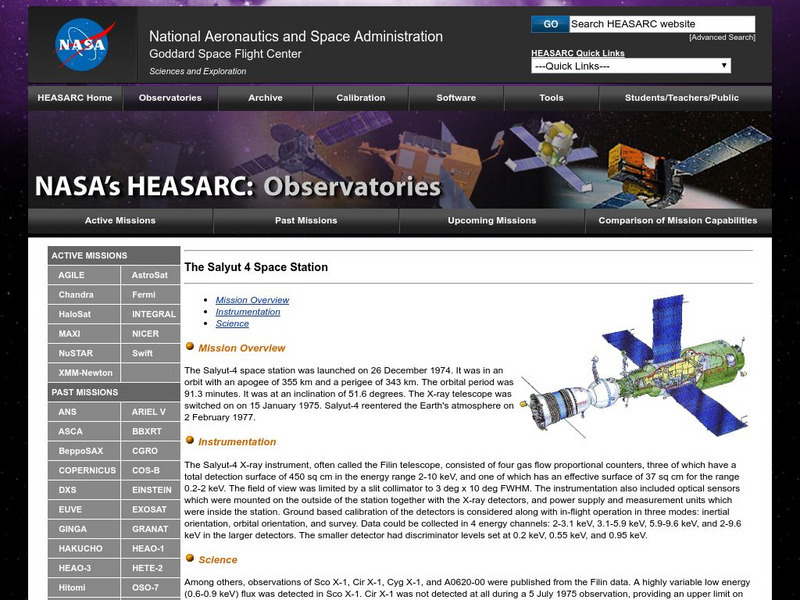NASA
Nasa: Sea Surface Temperature Trends of the Gulf Stream
Students investigate changes in the surface temperatures of the Gulf Stream over the course of the seasons using data collected by NASA's satellites. The data is inputted into a spreadsheet and graphed.
NASA
Nasa: Trends of Snow Cover and Temperature in Alaska
This lesson plan allows students to use NASA satellite data observations with surface measurements of snow in Alaska. Students will be able to make scientific predictions, find data correlations, and learn about data collection methods.
NASA
Math Lesson Plan: Cyanobacteria Races: Cyanobacteria Motility [Pdf]
A comprehensive lesson plan about the movement of cyanobacteria includes a class experiment.
NASA
Nasa: Cassini Solstice Mission Timeline
Interactive timeline allows user to view the entire history of the Cassini Solstice Mission to Saturn due to be completed in 2017.
NASA
Nasa: Solar System Exploration
This stunning site on the solar system gives a great overview of the planets and our sun. Learn about each object's size, vital statistics, and moons. Then go on for a more in depth look at these objects in the column on the left.
NASA
Nasa: Climate Kids
Climate Kids thoroughly covers climate change and global warming. There are videos, games, puzzles (e.g., Cloud Picture Scrambles), interactives (e.g., the Climate Time Machine) and stories (e.g., Climate Tales). An educators' page links...
NASA
Nasa: An Educator's Guide to the Engineering Design Process: K 2 [Pdf]
The NASA BEST Activities Guides were designed to teach students the Engineering Design Process. This is one of three guides targeting different grade groups. All follow the same set of activities and teach students about humans' endeavor...
NASA
Nasa: Precipitation Towers: Modeling Weather Data
This lesson uses stacking cubes as a way to graph precipitation data, comparing the precipitation averages and seasonal patterns for several locations. Variations on the lesson can accommodate various ages and ability levels. Students...
NASA
Nasa: What Is a Planet?
This lesson teaches students about the characteristics of planets, comets, asteroids, and trans-Neptunian objects. After learning about these different things, students then are to debate about a new object that is found in space.
NASA
Nasa: Rocket Modeler Iii 1.2h Beta
This NASA program offers users the opportunity to understand rocket design by working with variable values. Java is needed for RocketModeler III 1.2h to run.
NASA
Nasa: Polar Ice and Its Possible Effects on the Earth
This article describes the effects of polar ice caps on the Earth and offers explanations as to the possible effects of polar ice melting on sea level and temperature.
NASA
Nasa: Hubble Finds 16 Exoplanet Candidates
In the past, extrasolar planets have either been too far away to detect or conditions did not allow them to be seen. Hubble has made this possible and has determined that planets are as abundant in other areas of the milky way as they...
NASA
Nasa: Astronaut Biography:roberta Bondar, Canadian Space Agency
This site covers the fascinating career of astronaut Roberta Bondar.
NASA
Nasa: Salyut 4
Overview of the Salyut 4 space station mission and instrumentation. Has a great picture of the computer rendering of the space station.
NASA
Nasa: History of Flight
How did we learn to fly? Resource takes users back through time to discover where the history of flight all started. Offers links to games, art and stories as well as activities.
NASA
Nasa: World Book at Nasa: Sun
World Book Encyclopedia article, hosted by NASA, covers key details about the sun, incuding size, composition, radiations, rotation, vibration, magnetic fields, zones of the sun, solar wind, sun spots, and related topics.
NASA
Nasa: Callisto 3 Images
This site from NASA provides a complete collection of images during orbit 3 of Jupiter's moon Callisto. Also links to data released from all Galileo orbits to date. Check the "Family Portraits" of the Galilean moons and other images at...
NASA
Nasa: Russia Meteor Not Linked to Asteroid Flyby
The large fireball observed on the morning of Feb. 15, 2013, in the skies near Chelyabinsk, Russia, was caused by a relatively small asteroid that entered Earth's atmosphere at high speed and at a shallow angle. Preliminary information...
NASA
Nasa: Solar System Exploration: Phobos
General information about Mars' moon Phobos can be found on this site. An image is also provided.
NASA
Nasa: Astronaut Biography: Eileen Collins
NASA biography of Eileen Collins the first woman space shuttle commander(Columbia, STS-93).
NASA
Nasa: Astronaut Biography: Story Musgrave
Biographical data from the Johnson Space Center on astronaut Story Musgrave (M.D.).
NASA
Nasa: Spacewalking
Several questions about "spacewalking" and the requirement that the astronaut wear a space suit are discussed.
NASA
Nasa: Two Special Girls Use Nasa Spacesuit Technology
Seeking a broader use for spacesuit technology, Johnson Space Center scientists work with two girls who have "xeroderma pigmentosum", a disease that prevents them from tolerating exposure to sunlight or even bright indoor lighting. Using...




![Math Lesson Plan: Cyanobacteria Races: Cyanobacteria Motility [Pdf] Lesson Plan Math Lesson Plan: Cyanobacteria Races: Cyanobacteria Motility [Pdf] Lesson Plan](https://d15y2dacu3jp90.cloudfront.net/images/attachment_defaults/resource/large/FPO-knovation.png)








